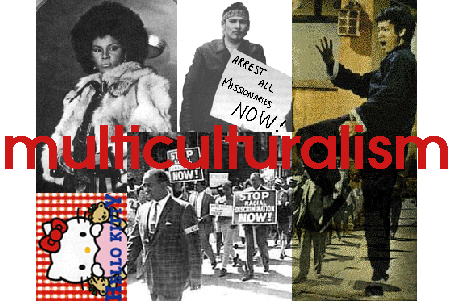

America does not belong to one race or group . . . Americans have been
constantly redefining their national identity from the moment of first
contact on the Virginia shore.
-- Ronald Takaki, A Different Mirror
Multiculturalism is a term which came
into
usage after the idea of
a "melting pot" was criticized by minorities as both assimilationist and
white-dominated. The social idea of a multiplicity of racial and ethnic
identities, unique yet also hybrizing, greatly influenced
artistic and intellectual production after the war. It is associated with
identity politics and aesthetic productions generated after, and inspired
by, civil rights movements of the 1950s and 60s. For our purposes here, a
multiculturalist is any person of color, white ethnic, or biracial
person whose work is largely oriented around issues of race and/or
ethnicity. Multicultural writing after World War II is often defined by
autobiographical or pseudo-autobiographical work (e.g. Carlos Bulosan and
Maxine Hong Kingston), and by a growing investment in the idea that racial
and ethnic minority voices are a crucial element in United States literary
history and culture.
As many critics of the Internet have noted, the World Wide Web is a very
white place; the lack of websites devoted to multicultural authors
reflects this bias. There are, however, many commercial, social, and
entertainment sites devoted to issues in multiculturalism and specific
groups.
Links
General
- African-American
Webliography
LSU Libraries offers an extensive and wellpmaintained list of "African
Americana," including links to bibliographies and catalogues.
- Black Cultural Studies
Website
Articles by and information about critics in the field of black cultural
studies.
- Black Film Center
and Archives
A major resource at Indiana University, with a complete listing of this
film collection.
- W.E.B. DuBois Institute
for
Afro-American Research
Information clearinghouse for this famous African-American think tank at
Harvard University. Includes research resources, announcements of
upcoming events, and calls for papers.
- Postcolonial
Studies
A resource for students of postcolonial literature and theory at Emory
University. Good introductory bibliographic materials and definitions of
key terms in the field.
- Universal Black Pages
Run by students at Georgia Tech, this comprehensive resource covers both
scholarly and community-related issues: everything from the Diaspora to
business.
- Writing
Black
Research resources on literature and history by and about
African-Americans. Good bibliographical data and some useful links.
- The
African-American Mosaic
A library of congress resource guide for the study of black history and
culture.
- Multicultural
Bibliography
An extensive bibliography of works by and about Native Americans across
the US. The "multicultural" refers to multiple tribes.
- Native
American Literature On-line
Brought to you by Native Web, this site includes the full texts of some
Native American works, along with interviews, articles, and links. Very
good coverage of contemporary authors.
- Native American
Authors
Information on Native American authors with bibliographies of their
published works, biographical information, and links to on-line resources.
Specializes in contemporary authors.
- The Native Book Centre
A searchable database and book catalogue devoted to "the aboriginal
peoples of Canada and the US."
- Asian-American
Literature
USC's library research resources in Asian American literature and history,
includes dissertations, bibliographies, criticism, recordings, and more.
A unique site, and highly recommended.
- South Asian
American
Literature Page
Information and reviews about recent fiction by authors hailing from the
Indian subcontinent. Also, the home of HUM magazine, devoted to South
Asian American twentysomethings.
- Latino
Literature Homepage
Some literature, as well as cultural resources.
- Queer Chicana
Fiction
An extensive bibliography.
- Chicana
Feminist Homepage
Great introductory materials in Chicana literature.
- Jewish-American
Literature Research
Devoted to contemporary Jewish authors, plus a selected bibliography.
Authors
Magazines and Journals
- A Magazine
A hip, contemporary magazine devoted to everything Asian-American. Their
motto: "Asia . . . one of the biggest influences on the West."
- TM Web
Leading Asian American magazines Transpacific,
Face, XO, and Tea are
featured here. Also includes information on contemporary Asian-American
Art, culture, and fiction.
- Latino Link
A website "con sabor." Weekly news and views from the online Latino
community. Features good arts coverage.
-
Black Renaissance/Renaissance Noire
A journal that publishes essays, fiction, reviews, and artwork that
address the full range of contemporary Black concerns.
- American Indian Quarterly
A refereed, scholarly journal that examines Native North America from an
interdisciplinary perspective.
- Native
Americas
The quarterly publication of Akwe:kon Press of the American Indian Program
at Cornell University. It features articles that cover the most important
and critical issues of concern to native (indiginous/aboriginal) peoples
throughout the Western Hemisphere.
Return to:
Genres
Home



